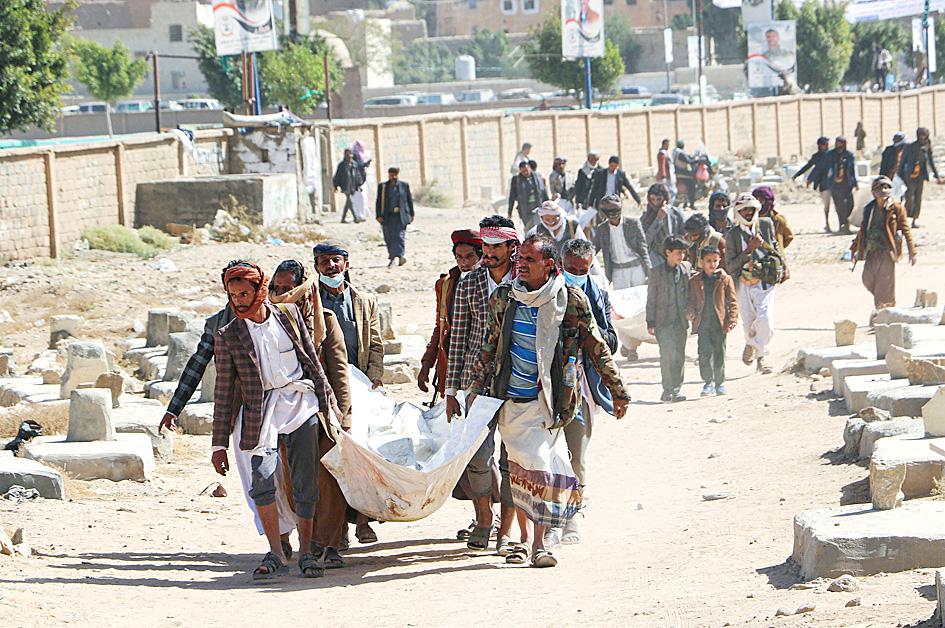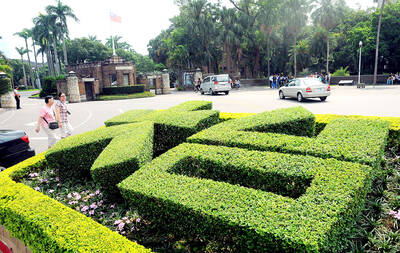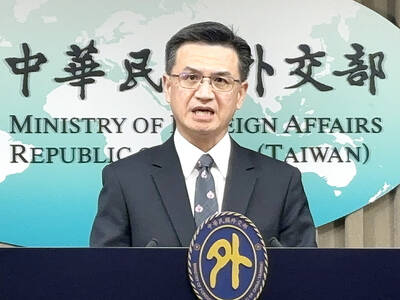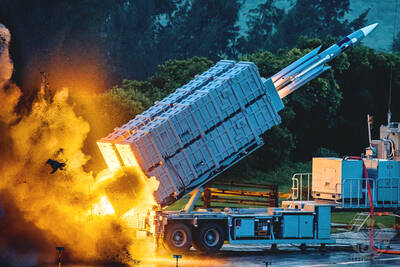More than 50 million people are affected by conflict in urban areas from Afghanistan to Libya, Syria, Yemen and beyond, where they face a much higher risk of being killed or injured, UN Secretary-General Antonio Guterres said on Tuesday.
In some cases, civilians might be mistaken for combatants and attacked, while in others, fighters do not try to minimize harm and use explosive weapons in crowded areas that lead to devastating suffering for ordinary people who face life-long disabilities and grave psychological trauma, Guterres told a UN Security Council meeting on the protection of civilians in urban settings during wars.
During last year’s fighting in Gaza between Israel and Hamas militants, dozens of schools and healthcare facilities were damaged, and nearly 800,000 people were left without piped water, he said.

Photo: Reuters
In Afghanistan, an explosive attack outside a high school in the capital, Kabul, in May last year killed 90 students, mainly girls, and injured an additional 240 people, he said.
The risk of harm to civilians “rises when combatants move among them, and put military facilities and equipment near civilian infrastructure,” he said.
However, conflict in urban areas “goes far beyond its immediate impact on civilians,” he said.
Urban warfare also put civilians at risk of sieges and blockades that have led to starvation, he said.
It also forces millions of people from their homes, “contributing to record numbers of refugees and internally displaced people,” and it creates millions of tonnes of debris that affect the environment and people’s health, he said.
“Four years after the destruction of 80 percent of housing in Mosul, Iraq, an estimated 300,000 people were still displaced,” he said.
“The frightening human cost of waging war in cities is not inevitable; it is a choice,” Guterres said.
He urged combatants to respect international humanitarian law that prohibits attacks on civilians or civilian infrastructure, and also bars indiscriminate attacks and using civilians as human shields.
He also urged fighters not to use explosive weapons with wide-area effects in populated areas and to “gauge the impact of their operations and find ways to minimize harm.”
International Committee of the Red Cross president Peter Maurer told the council there is “mounting evidence of the unacceptable harm of warfare in urban areas to civilians.”
Repeated calls for action have not resulted in major improvements and the urbanization of conflicts “is having massively negative impacts on populations in urban areas,” he said.
Ghanian Vice President Mahamadu Bawumia said that “the rise of terror and violent extremist groups,” including Boko Haram, al-Qaeda in the Maghreb, al-Shabaab in Somalia and the Islamic State, “have revealed the true threat posed to civilian lives.”

Taiwan has experienced its most significant improvement in the QS World University Rankings by Subject, data provided on Sunday by international higher education analyst Quacquarelli Symonds (QS) showed. Compared with last year’s edition of the rankings, which measure academic excellence and influence, Taiwanese universities made great improvements in the H Index metric, which evaluates research productivity and its impact, with a notable 30 percent increase overall, QS said. Taiwanese universities also made notable progress in the Citations per Paper metric, which measures the impact of research, achieving a 13 percent increase. Taiwanese universities gained 10 percent in Academic Reputation, but declined 18 percent

Chinese President Xi Jinping (習近平) yesterday met with former president Ma Ying-jeou (馬英九) at the Great Hall of the People in Beijing, with Xi’s opening statement once more emphasizing that people on both sides of the Taiwan Strait are Chinese and that foreign intervention cannot change their inevitable unification. Xi said that 5,000 years of history of zhonghua minzu (中華民族, ethnic Chinese group) have seen their ancestors move to Taiwan to establish new lives, while also documenting them fighting side-by-side against foreign forces and finally freeing Taiwan. “Both sides are Chinese,” and there are no issues that cannot be worked through, he

BULLY TACTICS: Beijing has continued its incursions into Taiwan’s airspace even as Xi Jinping talked about Taiwan being part of the Chinese family and nation China should stop its coercion of Taiwan and respect mainstream public opinion in Taiwan about sovereignty if its expression of goodwill is genuine, the Ministry of Foreign Affairs (MOFA) said yesterday. Ministry spokesman Jeff Liu (劉永健) made the comment in response to media queries about a meeting between former president Ma Ying-jeou (馬英九) and Chinese President Xi Jinping (習近平) the previous day. Ma voiced support for the so-called “1992 consensus,” while Xi said that although the two sides of the Taiwan Strait have “different systems,” this does not change the fact that they are “part of the same country,” and that “external

UNDER DISCUSSION: The combatant command would integrate fast attack boat and anti-ship missile groups to defend waters closest to the coastline, a source said The military could establish a new combatant command as early as 2026, which would be tasked with defending Taiwan’s territorial waters 24 nautical miles (44.4km) from the nation’s coastline, a source familiar with the matter said yesterday. The new command, which would fall under the Naval Command Headquarters, would be led by a vice admiral and integrate existing fast attack boat and anti-ship missile groups, along with the Naval Maritime Surveillance and Reconnaissance Command, said the source, who asked to remain anonymous. It could be launched by 2026, but details are being discussed and no final timetable has been announced, the source